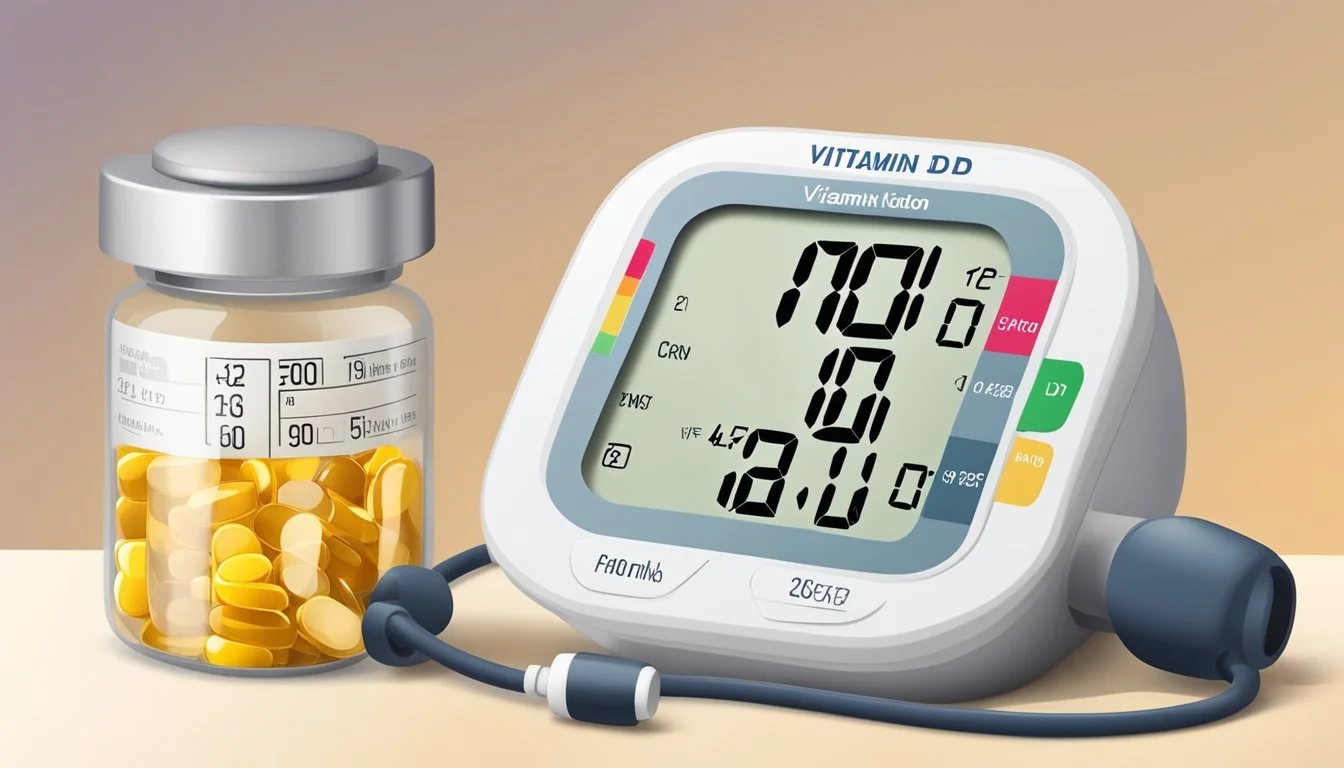What is the Role of Vitamin D in Blood Pressure Regulation
Understanding the Connection
Vitamin D is frequently recognized for its role in maintaining bone health, but its contribution extends well beyond that, playing a crucial part in regulating blood pressure and influencing cardiovascular health. Adequate levels of vitamin D are associated with several health benefits, and emerging research suggests that it may help manage blood pressure and reduce the risk of hypertension. Hypertension, or high blood pressure, is a significant condition that increases the risk of heart diseases and stroke, and it has various contributing factors, including genetics, lifestyle, and possibly vitamin deficiencies.
The biological mechanisms through which vitamin D may influence blood pressure involve the regulation of the renin-angiotensin-aldosterone system (RAS), which is essential for managing blood volume and systemic vascular resistance. Studies have observed that lower levels of circulating vitamin D metabolites correlate with higher blood pressure readings and a greater incidence of hypertension. Conversely, some evidence shows that vitamin D supplementation could have beneficial effects on blood pressure, although the extent of its impact and the populations that may benefit the most require further research to establish definitive clinical guidance.
Given vitamin D's potential involvement in cardiovascular regulation, the relationship between vitamin D status and blood pressure has become an area of active research. Findings indicate that vitamin D's regulatory effect on calcium homeostasis and intracellular calcium concentrations may be a contributing factor. While the body of evidence grows, the role of vitamin D in blood pressure regulation continues to be dissected through observational studies and clinical trials, elucidating the potential for vitamin D to serve as an adjunct in managing hypertension and promoting overall cardiovascular health.
Vitamin D Overview
This section provides essential information on vitamin D, its critical role in the human body, its various sources, and the implications of its deficiency or sufficiency.
Importance in the Body
Vitamin D is indispensable for its role in calcium absorption, crucial for maintaining bone health. Beyond skeletal support, it contributes to cellular functions, with anti-inflammatory, antioxidant, and neuroprotective properties. It's also instrumental in blood pressure regulation.
Sources and Forms
The body obtains vitamin D in several forms:
Cholecalciferol (Vitamin D3): Produced in the skin upon sun exposure; found in animal products.
Ergocalciferol (Vitamin D2): Sourced from plants and dietary supplements.
Dietary sources rich in vitamin D include:
Fatty fish: such as salmon and tuna.
Fortified foods: including milk and some cereals. Supplementation can ensure adequate levels, especially in regions with limited sunlight.
Deficiency and Sufficiency
Insufficient levels of vitamin D can lead to a deficiency, potentially causing rickets in children or osteomalacia in adults. Normal levels are typically reflected by sufficient concentrations of 25-hydroxyvitamin D in the blood. The body's sufficiency of vitamin D aids in maintaining proper cardiovascular health among other physiological benefits.
Blood Pressure Regulation
Blood pressure regulation is a critical aspect of cardiovascular health, involving complex mechanisms that keep systemic arterial blood pressure within optimal ranges.
Mechanisms of Control
Blood pressure is determined by cardiac output and systemic vascular resistance. Systolic blood pressure—the pressure in arteries during heartbeats—along with diastolic blood pressure—the pressure between beats—are the two primary measures for assessing cardiovascular health. The body controls these pressures through intricate systems that ensure adequate tissue perfusion while avoiding damage to blood vessels.
Factors Influencing Blood Pressure
Several factors influence blood pressure, including:
Vascular function: Healthy arteries are elastic and dilate to accommodate the blood pumped from the heart.
Arterial stiffness: Increased stiffness can raise systolic blood pressure, indicating a higher workload on the heart.
Lifestyle factors: Diet, exercise, and stress levels play a substantial role in blood pressure regulation.
Renin-Angiotensin System
The renin-angiotensin system (RAS) is a hormone system within the body that plays a crucial role in regulating blood pressure. When blood pressure drops, the kidneys release renin, a hormone that initiates a cascade of reactions resulting in the production of angiotensin II, a potent vasoconstrictor. Angiotensin II narrows blood vessels, raising blood pressure and signaling the adrenal glands to release aldosterone, which prompts water and sodium retention, further increasing blood pressure.
Interactions Between Vitamin D and Blood Pressure
Vitamin D plays a multifaceted role in the regulation of blood pressure, influencing various physiological pathways. Its interactions within the cardiovascular system are significant in understanding how it may impact hypertension.
Vitamin D Receptor Signaling
The active form of vitamin D, calcitriol, exerts its effects through the Vitamin D receptor (VDR). When vitamin D binds to these receptors, it can regulate gene expression. In the context of blood pressure, VDR signaling affects the renin-angiotensin-aldosterone system (RAAS), which is crucial for blood pressure homeostasis. Decreased VDR activity has been linked to increased renin and aldosterone levels, leading to higher blood pressure.
Influence on Vascular Health
Vitamin D is posited to contribute to vascular health by influencing the balance of calcium and phosphorus, important for normal blood vessel function. Deficiency in vitamin D is associated with the disruption of endothelial function, which can affect vascular resistance and, consequently, blood pressure. Moreover, the modulation of calcium flux in vascular smooth muscle cells by vitamin D can impact muscle contraction and blood flow regulation.
Vitamin D and Kidney Function
The kidneys play an essential role in regulating blood pressure by controlling fluid balance and synthesizing the active form of vitamin D, calcitriol (from cholecalciferol or ergocalciferol). Poor kidney function can lead to reduced calcitriol production and dysregulation of blood pressure. Furthermore, sufficient levels of vitamin D are necessary for the kidneys to properly filter blood and maintain blood pressure within a healthy range.
Role of Vitamin D in Hypertension and Cardiovascular Diseases
Vitamin D is recognized not only for bone health but also for its potential impact on hypertension and cardiovascular diseases. This section explores how vitamin D influences these conditions.
Influence on Cardiovascular Disease Risk
Evidence suggests that vitamin D deficiency is a potential risk factor for cardiovascular diseases (CVD). Studies have found that the heart and blood vessels contain components related to vitamin D that may influence cardiovascular health. A deficiency in vitamin D has been associated with an increased risk of developing several cardiovascular diseases.
Effects on Heart Health
Vitamin D plays a crucial role in maintaining heart health. It is involved in the regulation of the renin-angiotensin-aldosterone system (RAS), which has a direct effect on blood pressure levels. An imbalance in this system can lead to hypertension, and vitamin D has been recognized as a modulator that can reduce this risk by inhibiting RAS activity.
Link to Chronic Conditions
Long-term vitamin D deficiency may contribute to the onset and progression of various chronic conditions, including hypertension and cardiovascular diseases. While adequate levels of vitamin D support cardiovascular health, the exact mechanisms by which vitamin D affects chronic disease development remain an active area of research. However, the correlation between low vitamin D levels and higher prevalence of certain chronic conditions has been consistently observed.
Empirical Evidence and Research
This section examines the various research methods and their findings regarding the relationship between vitamin D and blood pressure regulation. The evidence ranges from observational studies to clinical trials and meta-analyses.
Observational Studies and Their Limitations
Observational research has consistently demonstrated an inverse relationship between serum 25-hydroxyvitamin D levels and blood pressure. Cohort studies suggest that lower levels of circulating 25-hydroxyvitamin D are associated with higher blood pressure and an increased risk of incident hypertension. However, such studies face limitations due to potential confounding factors and cannot establish causality.
Randomized Controlled Trials
Randomized controlled trials (RCTs) provide more rigorous evidence regarding the efficacy of vitamin D supplementation in blood pressure regulation. Evidence from RCTs indicates that vitamin D supplementation alone or in combination with other nutrients may have a role in managing blood pressure, particularly in populations like postmenopausal women and older adults. The data, however, show varying results, with some trials demonstrating significant reductions in blood pressure, while others report no substantial impact.
Meta-Analysis Findings
Meta-analyses, which aggregate data from multiple studies, provide a broader overview. They often use individual patient data and adhere to PRISMA guidelines for systematic reviews. The accumulated findings suggest that vitamin D supplementation may lead to slight reductions in blood pressure, especially in individuals with vitamin D deficiency. These findings also indicate that vitamin D's effect on blood pressure could be mediated through mechanisms like the modulation of plasma renin activity. However, some meta-analyses conclude that the effect size is modest and clinical relevance remains to be determined.
Clinical and Dietary Recommendations
Effective management of blood pressure involves both appropriate supplementation of vitamin D and adherence to lifestyle choices that promote optimal vitamin D levels.
Supplementation Guidelines
Medical professionals generally recommend vitamin D supplementation for individuals with deficiency or those at risk of deficiency, such as the elderly or individuals with limited sun exposure, especially during winter months. The standard dosage for supplementation usually ranges from 800 to 2,000 International Units (IU) per day for adults, but the specific dose can vary based on individual needs and existing blood levels of vitamin D. Regular monitoring through blood tests can help tailor the dosage for effective maintenance or improvement of blood pressure regulation.
Lifestyle Considerations for Optimal Levels
To maintain optimal vitamin D levels through lifestyle, diet and sunlight exposure fall under crucial factors. A diet rich in vitamin D includes foods like fatty fish, egg yolks, and fortified products such as milk and cereal. Safe sunlight exposure, generally about 10-30 minutes several times per week, can greatly enhance vitamin D synthesis in the skin. Maintaining a moderate weight and engaging in regular physical activity also contribute positively to both vitamin D status and overall cardiovascular health.



